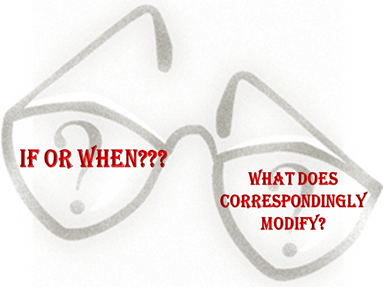Rising inventories, when unaccompanied correspondingly by increases in sales, can lead to production cutbacks that would hamper economic growth.
What does this question test?
 This question tests your knowledge of idiomatic usage of if and when. It also tests your understanding of modifiers, more specifically, what and how adverbs modify.
This question tests your knowledge of idiomatic usage of if and when. It also tests your understanding of modifiers, more specifically, what and how adverbs modify.
What does the sentence mean?
This sentence states that when rising inventories are not accompanied by increases in sales, there may be production cutbacks. These cutbacks would then hamper economic growth. Notice how the sentence really presents a condition – if event ‘a’ happens, then event ‘b’ happens.
What are the errors in the original sentence?
This sentence has modifier error. Notice that the adverb ‘correspondingly’ modifies the verb ‘unaccompanied’. Corresponding implies similar. Thus, this modification – correspondingly accompanied means – similarly accompanied – similar to what? Thus, this modification is ambiguous. Now we also should determine – what should correspondingly modify. Per the meaning of the sentence, two things are rising – inventories & sales – so correspondingly should be used for one of these factors – in this case – increases in sales. Thus, corresponding should modify the increases in sales. And hence the modification in choice A is incorrect.
This sentence also has idiom error. The sentence indicates a possibility. And hence usage of “when” is incorrect since the outcome is not a definite – it is just a possibility.
If is used to express conditional statements. If & When are interchangeable when the conditional if statement expresses facts or definite events. This topic is covered in detail here.
Answer Choice Analysis
Choice A: Incorrect: This choice has modifier and idiom errors as explained.
Choice B: Incorrect: This choice has idiom error as explained above.
Choice C: Incorrect: This choice has idiom error as explained above.
Choice D: Incorrect: This choice changes the intended meaning of the sentence. In this choice, correspondingly modifies increased sales. However, notice that in the original sentence, the author is talking about trends – rising inventories and increases in sales. This choice, on the other hand, talks about trend in inventories but for sales – it only talks about a specific value of sales – INCREASED sales. Thus, it does not communicate the intended meaning of the original sentence. And hence is incorrect.
Choice E: CORRECT: This choice communicates the intended meaning appropriately.














